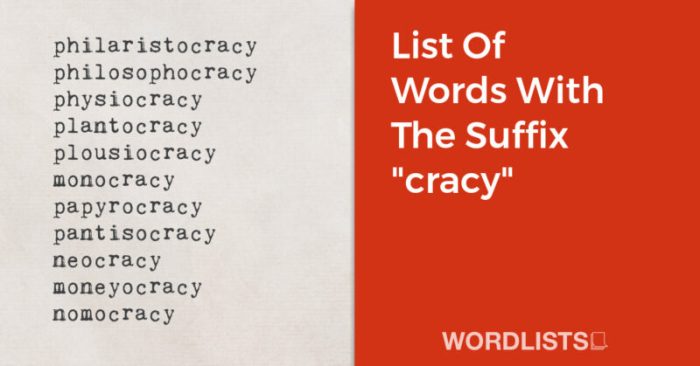Words that end with cracy – Embark on an enlightening journey into the realm of words that end with “cracy.” These captivating terms, such as democracy, autocracy, and bureaucracy, hold immense power in shaping our political, social, and cultural landscapes.
Their etymologies, semantic meanings, and historical evolution provide a fascinating lens through which we can explore the intricate tapestry of human civilization.
Types of Words that End with “cracy”

Words ending with “cracy” generally refer to systems of government or rule. They stem from the Greek word “kratos,” meaning “power” or “rule.” Different types of “cracy” words denote distinct forms of government, as explained below:
Democracy
Democracy is a system of government where power is vested in the people, typically exercised through elected representatives. The term originates from the Greek words “demos” (people) and “kratos” (rule), emphasizing the popular sovereignty of the people in decision-making.
Semantic Meaning and Usage: Words That End With Cracy

Words that end with “cracy” typically convey the idea of power, rule, or governance. They often refer to systems or forms of government, ideologies, or social structures that emphasize specific values or principles.
These words are commonly used in political, social, and economic contexts to describe different types of governments, political systems, or societal organizations.
Political Contexts, Words that end with cracy
In political contexts, words ending with “cracy” often refer to specific forms of government or political systems. For instance, “democracy” represents a system where power is vested in the people, “autocracy” signifies a government ruled by a single individual with absolute power, and “oligarchy” denotes a system where power is concentrated in the hands of a small group.
Words that end with cracy, like democracy and bureaucracy, often describe complex systems. If you’re interested in environmental regulations, check out the epa 608 study guide pdf . It’s a comprehensive resource for understanding the complexities of environmental protection and can help you navigate the intricacies of words that end with cracy.
Social Contexts
In social contexts, words ending with “cracy” can describe social hierarchies or systems. “Bureaucracy” refers to a system characterized by a hierarchical structure and rigid procedures, while “technocracy” represents a system where experts or scientists hold significant influence in decision-making.
Economic Contexts
In economic contexts, words ending with “cracy” can describe economic systems or ideologies. “Capitalism” is an economic system based on private ownership of capital, “socialism” emphasizes collective ownership of resources, and “mercantilism” refers to an economic policy that promotes trade and commerce.
Morphological Analysis
Words that end with “cracy” are formed through the combination of roots and suffixes. The root provides the core meaning of the word, while the suffix modifies or extends that meaning.
Role of Suffixes
The suffix “-cracy” is derived from the Greek word “kratos,” meaning “power” or “rule.” When added to a root, it denotes a system of government or rule. For example, in the word “democracy,” the root “demo-” (meaning “people”) combines with the suffix “-cracy” to form a word that means “rule by the people.”
Role of Roots
The roots of words that end with “cracy” vary widely, reflecting the different types of governments or systems they describe. Some common roots include:
- Auto-: Self (autocracy)
- Aristo-: Best or elite (aristocracy)
- Theo-: God (theocracy)
- Pluto-: Wealth (plutocracy)
- Geo-: Earth (geocracy)
Historical Evolution

The origins of words ending in “cracy” can be traced back to ancient Greek. The suffix “-cracy” comes from the Greek word “kratos,” meaning “rule” or “power.” Words ending in “cracy” typically refer to systems of government or social organization.
The first words ending in “cracy” emerged in ancient Greece, such as “democracy” and “aristocracy.” These words were used to describe different forms of government, each with its own unique characteristics and power structures.
Spread of “cracy” Words
Over time, words ending in “cracy” spread beyond Greece and were adopted into other languages, including Latin and English. As new forms of government and social organization emerged, new words ending in “cracy” were created to describe them.
Modern Usage
In modern usage, words ending in “cracy” continue to be used to describe systems of government and social organization. These words provide a concise and descriptive way to convey the nature and structure of different political and social systems.
Comparative Analysis
Words that end with “cracy” share a common theme of power and governance. However, they differ in their specific meanings, usage, and historical evolution.
Compared to other related terms like “archy” and “ocracy,” “cracy” generally denotes a system of government in which power is concentrated in the hands of a specific group or entity.
Similarities
- Shared Root:“Cracy” words all stem from the Greek word “kratos,” meaning “power” or “rule.”
- Connotation of Power:They carry a connotation of power and authority, often implying a system of governance.
- Historical Context:Many “cracy” words have been used throughout history to describe different forms of government.
Differences
- Specific Power Structure:Each “cracy” word denotes a distinct power structure, such as aristocracy (rule by nobles), autocracy (rule by a single individual), or bureaucracy (rule by administrative officials).
- Usage and Frequency:Some “cracy” words are more common and widely used than others, such as “democracy” and “autocracy.”
- Historical Evolution:The meanings and usage of “cracy” words have evolved over time, influenced by cultural, political, and social changes.
Cultural Impact

Words that end with “cracy” have a significant cultural impact, shaping political and social discourse, as well as influencing popular culture.
These terms often evoke strong emotions and associations, reflecting societal attitudes towards governance and power structures. They can be used to critique or celebrate political systems, as well as to categorize and understand different forms of government.
Influence on Political Discourse
Words like “democracy,” “autocracy,” and “theocracy” are central to political discussions, defining the nature of power and the relationship between citizens and the state. They shape debates about the best way to organize society and allocate authority.
Impact on Social Discourse
Beyond politics, “cracy” words also influence social discourse. Terms like “meritocracy” and “bureaucracy” describe systems of organization and hierarchy within society, shaping perceptions of fairness and equality.
Popular Culture References
Words that end with “cracy” have also found their way into popular culture. Movies, TV shows, and books often use these terms to explore political themes or create dystopian or utopian societies. For example, the film “V for Vendetta” depicts a totalitarian society called “Norsefire,” while the TV series “The Handmaid’s Tale” presents a theocratic regime named “Gilead.”
FAQ Corner
What is the origin of the suffix “-cracy”?
The suffix “-cracy” originates from the Greek word “kratos,” meaning “power” or “rule.”
How do words that end with “-cracy” differ from other words?
Words that end with “-cracy” typically denote systems of government or social organization, emphasizing the exercise of power and authority.
Can you provide an example of a word that ends with “-cracy” and explain its meaning?
The word “democracy” refers to a system of government where power is vested in the people, typically through elected representatives.